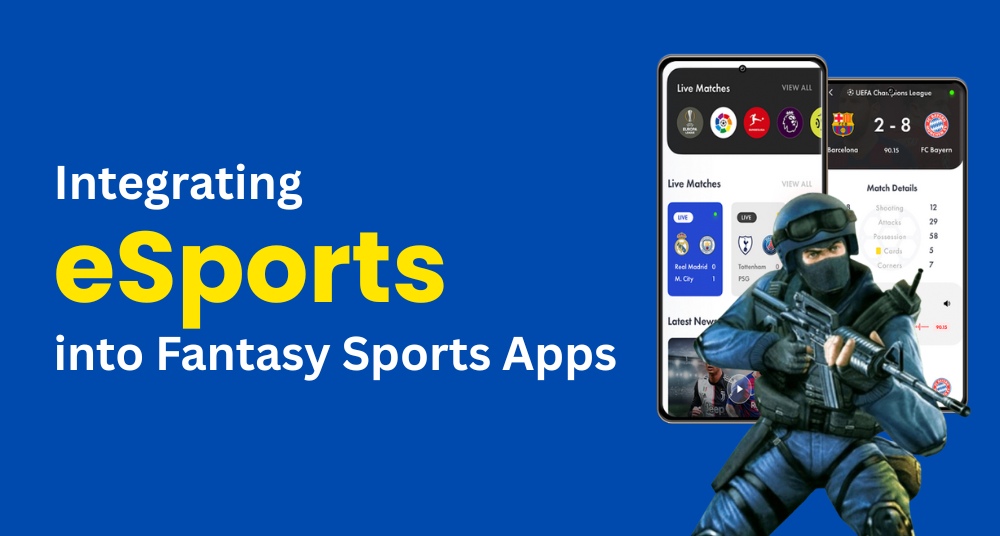In recent years, eSports has skyrocketed in popularity, garnering millions of viewers and fans worldwide. Along with this boom in eSports, the rise of fantasy sports has revolutionized the way fans interact with their favorite sports. Both industries have seen impressive growth, creating an opportunity for innovation and new business models. One such opportunity lies in integrating eSports into fantasy sports apps, creating a dynamic experience that appeals to a broad range of sports enthusiasts. eSports app development has become a vital part of this shift, allowing developers to blend traditional fantasy sports mechanics with the fast-paced, digital nature of eSports.
As the boundaries between traditional sports and digital entertainment continue to blur, fantasy sports app development professionals are finding new ways to keep their platforms fresh, engaging, and ahead of the curve. Integrating eSports into fantasy sports apps represents a thrilling frontier, combining the excitement of live gaming events with the strategic depth of fantasy sports.
Why eSports and Fantasy Sports are a Perfect Match?
At first glance, traditional fantasy sports and eSports might seem like two very different entities, but upon closer inspection, they share several key elements that make them a perfect match. Both systems rely heavily on statistics, performance metrics, and strategic decision-making to determine outcomes, making them natural bedfellows for integration.
Data-Driven Engagement
Fantasy sports thrive on data and player performance statistics. Similarly, eSports generates a wealth of data, such as kills, deaths, assists, game-winning plays, and more, which can be used to create fantasy teams. This data-driven nature makes eSports a perfect candidate for fantasy sports-style gameplay.
Strategic Decision Making
In both fantasy sports and eSports, participants need to make strategic decisions—whether it’s drafting the best players in fantasy leagues or selecting the most skilled eSports teams and players for fantasy competitions. This level of strategy appeals to fantasy sports players, who are always looking for ways to optimize their chances of winning.
Fan Engagement
Both industries are driven by passionate fan bases. eSports fans are known for their deep investment in their favorite teams, players, and tournaments, much like traditional sports fans. By integrating fantasy sports elements into eSports, fans can engage with their favorite games in new ways, adding layers of excitement and involvement.
Real-Time Play
eSports tournaments are fast-paced and often feature real-time results that can be used to influence fantasy sports leagues and team compositions. The integration of live game data into fantasy sports apps can create a seamless experience where fantasy players can adjust their teams in real-time, just as traditional fantasy sports leagues allow for live substitutions and trades.
Tournaments and Prize Pools
eSports tournaments often feature massive prize pools, which can easily be adapted into fantasy sports models. Participants in fantasy eSports leagues could compete for cash prizes, merchandise, or even the chance to attend live eSports events, further boosting the appeal.
Steps to Integrate eSports in Fantasy Sports Apps
Integrating eSports into fantasy sports apps involves several steps, each requiring thoughtful planning and execution. From designing the user interface to ensuring seamless data integration, here are the key steps in eSports app development for fantasy sports:
Choose the Right Games
Not all eSports titles are suitable for fantasy sports. The game needs to have measurable player performance metrics and a competitive, team-based structure. Popular titles like League of Legends, Dota 2, Overwatch, and Counter-Strike: Global Offensive fit this mold perfectly, as they generate comprehensive statistics that can be used in fantasy leagues.
Develop Fantasy Scoring Systems
In traditional fantasy sports, points are awarded based on player performances—goals, assists, yards gained, etc. Similarly, a scoring system needs to be developed for eSports, taking into account in-game performance such as kills, assists, damage dealt, or objective completions. Creating a balanced and fair scoring system will encourage players to engage with eSports fantasy leagues.
Real-Time Data Integration
One of the critical components of fantasy sports app development is integrating real-time data feeds. For eSports, this means pulling live game statistics directly from eSports tournaments or matches. Leveraging APIs and third-party providers to access this data is crucial to creating an engaging, real-time fantasy sports experience.
User Interface (UI) Design
The user experience (UX) and interface are vital when integrating eSports into a fantasy sports app. Players need to easily navigate between different games, teams, and statistics. A visually appealing and intuitive interface will make it easier for users to track their fantasy teams and participate in leagues. Additionally, real-time score updates, player stats, and leaderboards should be clearly visible to users.
Mobile Optimization
With the growing use of smartphones for gaming and fantasy sports, optimizing the app for mobile devices is essential. eSports app development should ensure that fantasy sports apps are responsive and perform well on mobile platforms. Gamers are often on the go, and they should have seamless access to their fantasy eSports teams at any time.
Community Features
Building a strong sense of community is crucial for both eSports and fantasy sports. Incorporating social features such as chat rooms, leaderboards, forums, and the ability to share results and strategies can enhance user engagement. Additionally, offering competitive leagues, daily fantasy challenges, or even social media integration can help to increase retention.
Legal and Regulatory Compliance
When integrating eSports into fantasy sports apps, developers must ensure compliance with local laws and regulations. Gambling regulations, data privacy laws, and age restrictions vary from region to region and need to be taken into account to avoid potential legal issues.
Common Issues When Integrating eSports into Fantasy Sports Apps
While integrating eSports into fantasy sports apps presents tremendous potential, there are several challenges to overcome:
Data Accuracy and Latency
eSports data is often fast-paced and complex, and ensuring that the data is accurate and up-to-date is vital for fantasy sports apps. Any delay in data processing or inaccuracies in player statistics can significantly impact the user experience and the fairness of the fantasy competition.
Game Integration
Not all eSports games have the same level of data accessibility. Integrating data from games with less robust APIs or inconsistent data can be a challenge. Ensuring that all relevant game stats are available for fantasy scoring is key to a successful integration.
Monetization
While fantasy sports apps generate revenue through entry fees, sponsorships, and advertising, integrating eSports into fantasy sports apps requires a different approach to monetization. Developers must create a sustainable revenue model, whether it’s through entry fees for fantasy eSports leagues, in-app purchases, or advertisements related to the games and tournaments.
User Engagement
Unlike traditional sports, eSports can have unique challenges related to user engagement. For instance, eSports matches can be long and vary in pace. Keeping users engaged throughout the entirety of a match or tournament, particularly for players new to eSports, may require thoughtful UX design and content strategies.
The Future: Cross-Platform Experiences
The future of eSports and fantasy sports is undoubtedly cross-platform. As the digital ecosystem continues to evolve, there will be a growing demand for cross-platform experiences that allow users to engage with eSports fantasy leagues on multiple devices, whether they are on their mobile phones, PCs, or consoles. Offering seamless transitions between devices and ensuring that users have access to their fantasy teams at any time and place will be crucial for maintaining user engagement and satisfaction.
Furthermore, as virtual and augmented reality (VR/AR) technologies mature, the integration of these technologies into eSports app development could offer immersive new ways for users to experience fantasy sports. Imagine attending a virtual eSports match with your fantasy team, watching your selections in real-time, and making live decisions based on your players’ performances in a 360-degree, interactive environment.
Final Thoughts
Integrating eSports into fantasy sports apps is an exciting opportunity for fantasy sports app development companies. By tapping into the growing eSports market, developers can offer a fresh, engaging experience for users who want to merge their love for gaming with the strategy and competition of fantasy sports. However, to achieve success in this new frontier, developers must focus on seamless data integration, user-friendly interfaces, and real-time updates, all while ensuring the app is accessible across multiple platforms.
As the eSports industry continues to grow, the potential for innovative, cross-platform fantasy sports experiences is limitless. The future of eSports and fantasy sports is intertwined, and those who can effectively combine these two elements will be at the forefront of a new era in digital entertainment.



